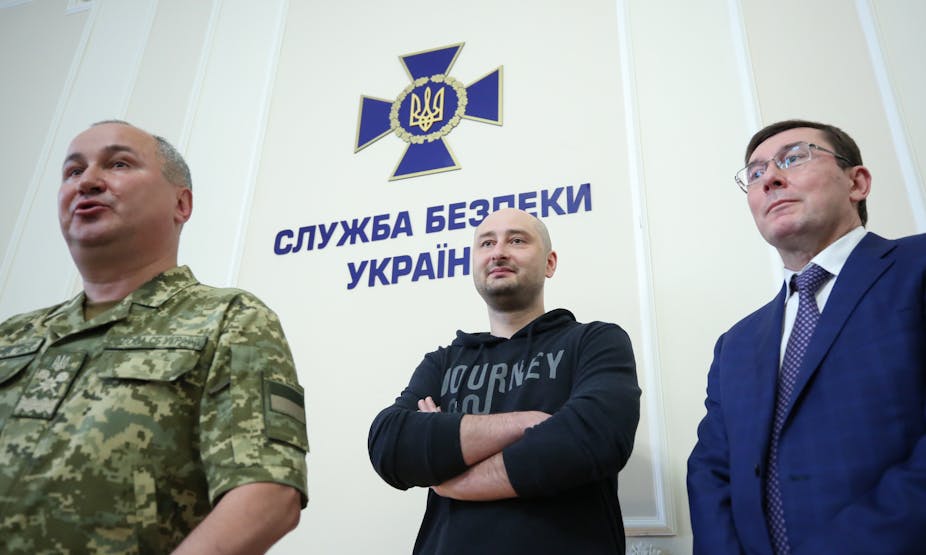When exiled Russian journalist Arkady Babchenko was reported assassinated in the Ukrainian Kiev, the Ukrainian prime minister, Volodymyr Groysman, explicitly pointed the finger at Russia for carrying out the murder. The world’s media duly siezed on it as another example of Moscow’s brutal methods of eliminating dissent, and in particular, of dealing with troublesome journalists. But suddenly, everything changed.
At a press conference less than 24 hours later, Babchenko was theatrically revealed to be alive and well. Standing alongside him, the head of Ukraine’s domestic intelligence agency, the SBU, and the country’s general prosecutor beamed from ear to ear as they explained that the murder had been faked to foil a genuine Russian assassination attempt.
It was a stunning about-face, but lurid stunts like these are far from unheard of in Ukraine. In the bad old days, which were supposedly consigned to history by the 2014 Euromaidan “revolution”, members of the Ukrainan elite would routinely sling embarrassing material (or “kompromat”) at each other as they wrestled for control over the so-called “blackmail state”. But this time, Ukraine’s “siloviki” (security forces), led by politically partisan figures personally appointed by president Petro Poroshenko, took the genre to a new level, deceiving a credulous world and compromising an entire nation.
Since Euromaidan, Russia’s annexation of Crimea and the conflict in the Donbas – which exposed the Ukrainian military as a hollowed-out fighting force – Ukraine has been transformed into an authoritarian security state. Spending on security has ballooned, and Western allies have provided military aid and training.
At the apex of the siloviki are the president himself, whose control over the armed forces has recently been enhanced; Arsen Avakov, the interior minister with alleged links to non-state far-right militias; and the general prosecutor, Yuri Lutsenko, who seemingly can mobilise the corrupt judiciary at will. Together with the SBU, these three men can exploit the entire Ukrainian security apparatus for their political purposes – and sure enough, the rest of the government appears to have been kept in the dark in the Babchenko affair.

While Babchenko’s resurrection amazed the wider world, Ukrainians will have been more sanguine. Faked deaths have been used as operational tactics many times before in recent years, and this one is only the latest in a series of high-profile sting operations that many onlookers regard as fantastical. Former MP Nadia Savchenko is currently detained, accused of plotting to launch a violent paramilitary coup and blow up the parliament and other buildings in central Kiev.
The siloviki justified Babchenko’s fake murder as an operational necessity, a ploy to foil an alleged Russian plot to murder the dissident journalist. But given the judiciary’s repeated failures to bring the perpetrators of heinous crimes to justice, who can be expected to believe that the ends justify the means?
Unforced errors
Babchenko’s resurrection may have been a brilliant display of security service tradecraft, but it made for woeful statecraft. The siloviki should be quietly pushing in the background for the normalisation of relations with Russia to grow the economy. Instead, this stunt is bound to backfire. It will undermine Ukraine’s credibility abroad, further delegitimise the state in the eyes of its already unimpressed citizens, and prolong the armed conflict in the Donbas.
Many powerful Western officials, generally well-disposed towards Ukraine and its current government, will resent being fooled just so the SBU could demonstrate its prowess at Russian-style hybrid warfare. Foreign scepticism about the operations and motives of Ukraine’s state agencies will increase, and Western officials will think twice when Ukrainian officials ask for military and security assistance.

But the Babchenko affair is also a wake-up call for the West itself. It demonstrates that anti-Russian hysteria (justified or not) in Ukraine and the West writ large may be becoming a self-fulfilling prophecy. Ukraine has already been caught up in Robert Mueller’s investigation into alleged collusion between Donald Trump’s presidential campaign and the Russian government. Taken to an extreme, anti-Russian feeling can destabilise powerful, mature democracies such as the US just as much as weak authoritarian countries like Ukraine.
It should be clear that extended tangling with Russia is harming mature and aspiring Western democracies alike. It is distorting diplomacy and national security; it is poisoning public political discourse and undermining the body politic. To preserve its own stability and sanity, the West needs to adjust to an assertive Russia, abandon any hopes of imminent regime change in Moscow, and carve out a modus operandi for peaceful coexistence. The Ukrainian siloviki’s theatrics will only make that more difficult.

